With just under four weeks to go until the 2023 Rugby World Cup kicks off in Paris, we're looking back at the history of the tournament from its origins in New Zealand and Australia 36 years ago, to its tenth instalment in France this September.
This week, we're looking back at the 2007 tournament which was also played in France.
For the second time, South Africa were crowned world champions holding off England in another tryless final. The decider may have been an anticlimax, but as a whole the 2007 tournament arguably produced more drama than we’ve ever seen.
The Hosts
In 2003, France were awarded hosting rights for the 2007 tournament, taking the IRB council vote 21-3 against the bid from England.
As had become customary in northern hemisphere World Cups, the host country spread the wealth around, with the Millennium Stadium in Cardiff given three pool games and a quarter-final, while Murrayfield in Edinburgh was allowed host two of Scotland’s Pool C matches.
Ireland had been scheduled to play a number of their own games at Lansdowne Road, but had to withdraw the privilege once their plans to redevelop what is now the Aviva Stadium were set in stone. With hindsight, those home games would have come in handy.
Stade de France was the flagship venue, hosting the final and both semi-finals, while a second Parisian venue was also used; Parc des Princes – home of Paris Saint Germain – was used for the bronze medal game.
Stade Velodrome in Marseille was also one of the major stadiums in the French bid, while Lens, Lyon, Bordeaux, Nantes, Toulouse, Saint-Etienne and Montpellier each hosted pool games.
The 2007 RWC also saw a major step-up in the size of venues used, with Stade de la Mosson in Montpellier’s 33,900 capacity being the smallest ground used.
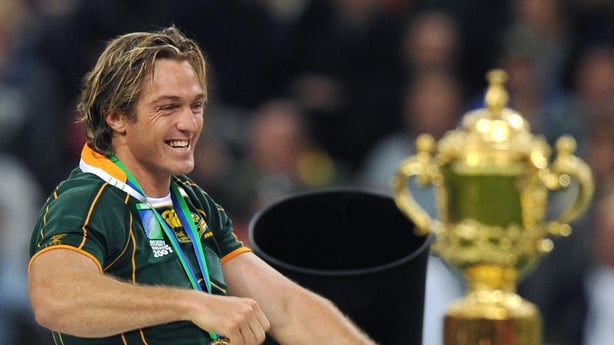
The story of the RWC: Jonny Wilkinson kicks England to glory in 2003
Pools
Pool A: England, Samoa, South Africa, Tonga, USA
Pool B: Australia, Canada, Fiji, Japan, Wales
Pool C: Italy, New Zealand, Portugal, Romania, Scotland
Pool D: Argentina, Georgia, France, Namibia, Ireland
The story of the RWC: Aussies party like it's 1999 as All Blacks stunned by Les Bleus
Ireland
Where do we even start?
In the long history of Irish Rugby World Cup disappointments, 2007 stands alone. As bad as the 1999 defeat to Argentina was, Ireland’s 2007 tournament in France was a car crash in slow motion.
To fully appreciate the downfall, we need to look back on how good things had been for Ireland leading up to the tournament.
Since the 2003 World Cup in Australia, Ireland had developed into one of the top teams in the world under Eddie O’Sullivan.
While they were still yet to break their glass ceiling of winning a Six Nations championship, three second-place finishes in four seasons were proof of a consistent side.
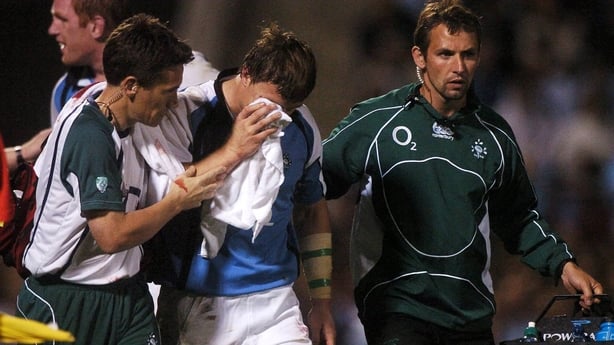
In 2007, it looked like they were even timing their run nicely; having beaten both South Africa and Australia in November 2006, they followed it by hammering England at Croke Park in the Six Nations, and had it not been for a late Vincent Clerc try they could and should have beaten eventual champions France.
They would have to take on France again in the World Cup, and while they hadn’t beaten Les Bleus since 2003, it was somewhat reassuring that they had come so close to doing so in the Six Nations. Old foes Argentina would also be a challenge, but one Ireland were expected to overcome, while their opening games agaisnt Namibia and Georgia were a chance to rack up some big scores.
Those heights made the eventual fall worse.
So much has been spoken and written about that 2007 tournament, but the general consensus is that Ireland were over-trained in physical terms and under-prepared in rugby terms.
The warning signs were there in pre-season. They opted for just two warm-up Tests against Scotland and Italy, with a friendly away to French side Bayonne in between.
With the benefit of hindsight, the Bayonne game was ill-advised. The hosts were more interested in roughing up France’s pool opponents, and those involved have described it as one of the most violent games they’ve played in. The night was capped off when Brian O’Driscoll was punched off the ball by lock Mikaera Tewhata and left with a fractured sinus.
By the time they reached their final warm-up against Italy at Ravenhill, it was a side that looked more concerned about making it to the tournament in one piece, and they needed a late Ronan O’Gara try to avoid an embarrassing defeat. The World Cup itself would prove that Ireland were just papering over the cracks.
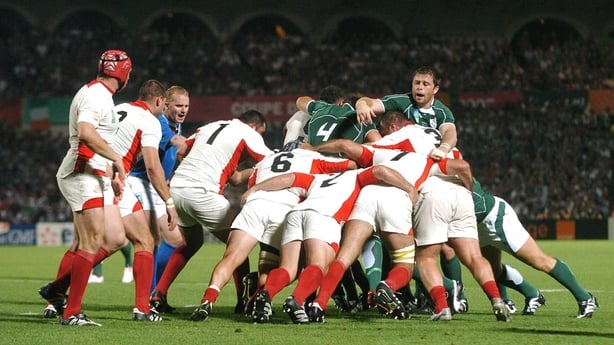
It started with a laboured 32-17 win against Namibia in Bordeaux, the same Namibia that had lost 105-13 to South Africa in a warm-up game a few weeks earlier.
A week later it got even worse as they clung on to a 14-10 win against Georgia, needing Denis Leamy to hold a late Georgian effort up over the tryline.
"After Georgia, we reached panic mode," Jerry Flannery later told Tom English’s book 'No Borders’.
"We were spending longer and longer on the training pitch. Everything snowballed."
On and off the pitch things were snowballing. Rumours of training ground fights and personal lives of players were spreading daily. While they were untrue, they ramped up the pressure.
With their two biggest games yet to come, Ireland looked desperate, and in a bid to shake things up, O’Sullivan dropped Peter Stringer for the meeting with France, bringing Eoin Reddan in at scrum-half.
Having already been beaten by Argentina, France were desperate themselves, but ultimately cruised to a 25-3 win.
It left Ireland heading into their final game against the Pumas needing a bonus-point win, and denying Argentina a losing BP of their own. They never came close, losing 30-15 at Parc des Princes.
Argentina would go on to top the pool and finish third overall, with Ireland left staring at the rubble of a wasted four-year cycle.
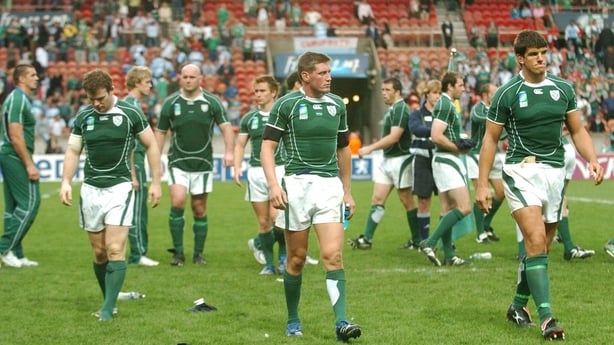
Ireland squad: Simon Best, Tony Buckley*, John Hayes, Marcus Horan, Bryan Young, Rory Best, Jerry Flannery, Frankie Sheahan, Donncha O’Callaghan, Paul O’Connell, Malcolm O’Kelly, Neil Best, Simon Easterby, Stephen Ferris, Alan Quinlan, David Wallace, Denis Leamy, Isaac Boss, Eoin Reddan, Peter Stringer, Ronan O’Gara, Paddy Wallace, Gordon D’Arcy, Brian O’Driscoll (capt), Gavin Duffy, Brian Carney, Denis Hickie, Shane Horgan, Andrew Trimble, Girvan Dempsey, Geordan Murphy
* Tony Buckley called up as an injury replacement for Simon Best
Results
Pool D: Ireland 32-17 Namibia (9 September – Stade Chaban-Delmas, Bordeaux)
Pool D: Ireland 14-10 Georgia (15 Septemberr– Stade Chaban-Delmas, Bordeaux)
Pool D: France 25-3 Ireland (21 September – Stade de France, Saint-Denis)
Pool D: Argentina 15-30 Ireland (30 September – Parc de Princes, Paris)
The story of the RWC: Springboks unite a nation in 1995
The 2007 Rugby World Cup could have looked very different had England won the rights to host it.
Part of the English bid was a radical proposal to change the format that had been in place in 2003, which would have seen the main tournament reduced from 20 teams to 16.
Under the proposal, the pool stage would see four groups of four, with the top two from each advancing to another pool of eight teams which would replace the quarter-finals.
Running alongside the main World Cup would be a second tier competition of 20 emerging nations, increasing the number of games overall from 48 to 88.
Thankfully, the status quo was preserved, and the tournament ended up providing some major shocks, as well as a share of near-misses.
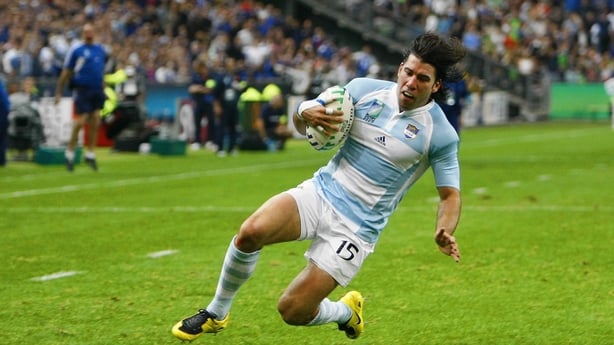
The surprises came right from the opening game, as Argentina stunned France at Saint-Denis, Ignacio Corleto scoring one of Los Pumas’ most famous tries as they flipped Pool D on its head with a 17-12 victory.
The result would have consequences beyond the pool. By finishing top of the pile, Argentina landed a favourable quarter-final against Scotland, while it also left France on a collision course with New Zealand – more on that later.
For the first time in a World Cup, it looked like the gap between the ‘haves’ and the ‘have nots’ was starting to close.
As discussed earlier, Ireland were given major scares by both Namibia and Georgia, and they weren’t the only major nation to struggle.
In Pool A, South Africa and England advanced to the quarter-finals as expected, but it was a group that provided its fair share of drama thanks to a memorable Tonga side.
Having won their opening two games against USA and Samoa, Tonga gave eventual champions South Africa a major fright in Lens, with two late tries and a penalty seeing them claim a losing bonus-point.
For a time, they led England 10-3 in ther final pool match, and although Brian Aston’s side would go on to win 36-20, the Pacific Islanders’ fearless brand of rugby made them one of the feel-good stories of the tournament.
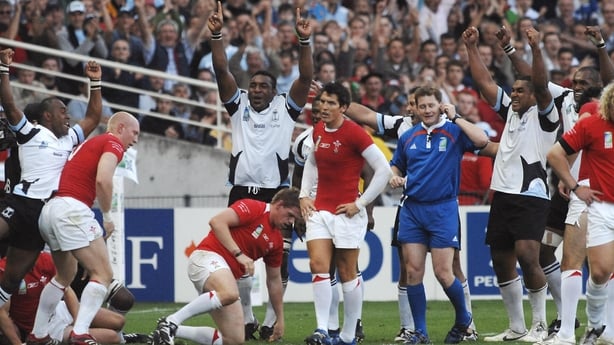
If Tonga had to settle for a moral victory, Fiji could do one better in Pool B. With Australia a comfortable winner of the group, it came down to the final game between Fiji and Wales in Nantes for second place and a quarter-final against the Springboks.
Even in a one-off game, Wales were expected to win easily enough, with Fiji having limped their way through the pool with sone uninspiring victories against Canada and Japan. In one of the Rugby World Cup’s greatest ever games, they pulled off one of its greatest ever shocks.
Leading 25-3 during the first half, the giant killing looked on, but Wales chipped away at the lead and by the 51st minute a Mark Jones try had put them 29-25 in front. A pair of Nicky Little penalties nudged Fiji back into the lead, but when Martyn Williams sprinted clear to score an intercept try on 73 minutes Wales regained control at 34-31.
It didn’t last. With three minutes left, prop Graham Dewes forced his way over for a fourth Fijian try, as they held on to not only claim a famous win, but reach the quarter-finals for the first time since 1987.
They couldn’t repeat those heroics in the knockout stage, losing 37-20 to South Africa as the Springboks booked a semi-final date with Argentina after the Pumas got the better of Scotland.
France’s pool stage slip-up meant they would have to go up against the tournament’s red-hot favourites New Zealand in the last eight. On top of that, the hosts had lost their home advantage having fallen into the one quarter-final that was due to be played in Cardiff’s Millennium Stadium.
By now, we’d come to expect drama at this World Cup. It started when the French side raised a challenge to the pre-match Haka, marching towards them in a ‘tricolore’ of red, white and blue t-shirts (below).
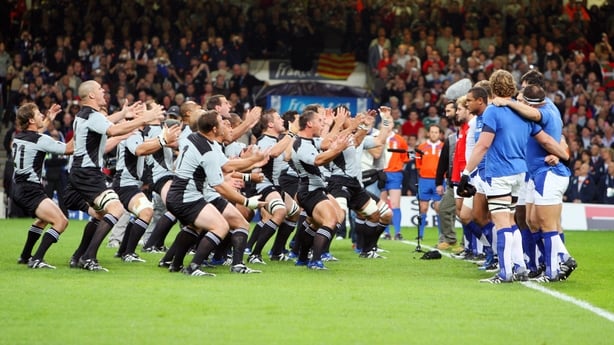
The game would be decided by a moment of controversy, Yannick Jauzion’s try 11 minutes from time moving France ahead for the first time in the game as they held on for a 20-18 win. Crucially, referee Wayne Barnes had missed a clear-cut forward pass in the build up.
From the peak of their quarter-final win against New Zealand, Bernard Laporte’s side quickly fell into the valley with a semi-final defeat to England.
Brian Ashton’s England had been largely unfancied coming into the tournament after going through a period of transition following their 2003 success. With Jonny Wilkinson fit again, they would always be dangerous though, and after he kicked all 12 points in their surprise quarter-final win against Australia, he steered them to a 14-9 win against the hosts a week later.
Unfortunately, a memorable tournament didn’t get the final it deserved. South Africa - who defeated Argentina 37-13 in the semis – held the defending champions at arm’s length in a tense final to win 15-6.
For the second time, the Springboks were world champions without even scoring a try in the final.
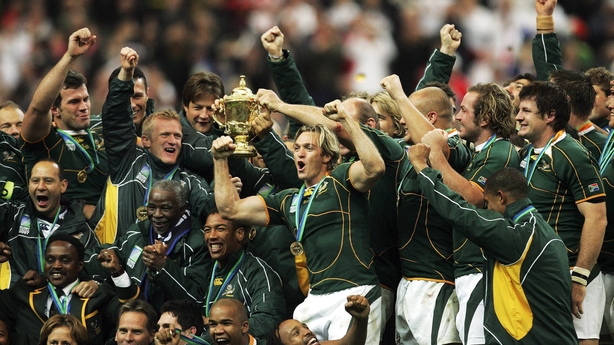
Top points scorers:
Percy Montgomery (South Africa): 105 points
Felipe Contepomi (Argentina): 91 points
Jonny Wilkinson (England): 67 points
Top try scorers:
Bryan Habana (South Africa): 8 tries
Drew Mitchell (Australia): 7 tries
Listen to the RTÉ Rugby podcast on Apple Podcasts, Soundcloud, Spotify or wherever you get your podcasts.
Watch live coverage of Ireland's Rugby World Cup warm-up games v England (19 August) and Samoa (26 August) on RTÉ2 and RTÉ Player, listen to live commentary on RTÉ Radio, or follow a live blog on RTÉ.ie and the RTÉ News app.


